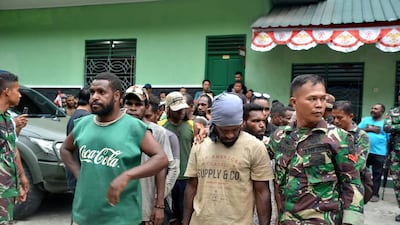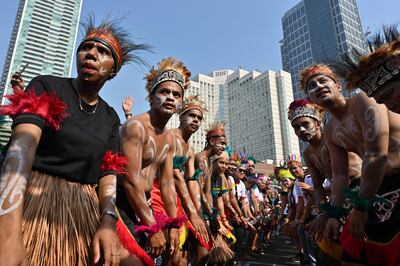How do you build a nation? This is a question still of imminent relevance to Indonesia, the world’s third largest democracy where violent unrest has broken out in the provinces of Papua and West Papua.
Melanesian and mainly Christian, the Papuans are ethnically and religiously different from the vast majority of their Muslim compatriots and are only part of the same country because Indonesia is the successor state to the Dutch empire in the "East Indies".
Whatever the rights and wrongs of Indonesia's treatment of its Papuan citizens, it is clear that much work needs to be done to make them feel part of and have a proper stake in the same nation as Indonesians from Java, Sumatra and the other islands.
In neighbouring Malaysia, we just celebrated independence day on August 31, but there was a distinct feeling that there was less to be joyful about this year, with two of the country's nine hereditary sultans issuing warnings about the state of race relations, which have worsened considerably since last year's election.
It is 62 years since the British left. One of their legacies is the large numbers of Malaysian Chinese and Indians who are the descendants of workers imported under colonial rule. Their contribution to the country's diversity is invaluable, but hopes that they might ever be treated as equal citizens have still not been realised. Here, too, there is nation-building work to be done.
This may be a task that is considered to be specific to "newer" nations, those whose freedom from foreign imperial rule is numbered in the tens rather than hundreds of years. It is certainly true that the confrontation over Kashmir, for instance, is at least partly attributable to Britain's drawing of the boundary between India and Pakistan in 1947. Likewise the issue of local autonomy for the Muslim Bangsamoro people in the southern Philippines has its origin in the centuries of Spanish colonisation, when most of their fellow Filipinos were converted to Christianity.
But nation-building is still an urgent task in developed countries – even in a superpower such as the US. For the historic idea of America as a melting pot where people of different races and religions from all over the world can make a home is under threat.
Ken Cuccinelli, the acting director of US Citizenship and Immigration Services, recently declared that the “tired, poor, huddled masses” that the Statue of Liberty’s inscription welcomes actually only refers to “people coming from Europe”, suggesting that the white nationalist ideology which many argue has been enabled by the Trump administration is now aiming to destroy and replace that foundation of diversity that seemed to be part of America's sense of itself.
In the UK, the language of politics is now virtually that of civil war. There has been the spectacle of the country's former top mandarin questioning whether civil servants ought to disobey government ministers over Brexit – an astonishing breach of the service's hallowed impartiality, while the First Minister of Scotland Nicola Sturgeon openly talks of the break-up of the union with England, Wales and Northern Ireland being a matter of when not if.
There had perhaps been a complacency in both countries, a sense that the hard work of nation-building and the construction of a sufficiently capacious, inclusive and binding identity that all shared had been done. It may have seemed so. Events over recent years have shown, however, that this is a job that is never finished, for many reasons.
For one, globalisation cannot be reversed; and in any case the history of humanity is one of wave after wave of migration. Hitherto ethnically homogenous societies have at some point or another nearly always had to decide how to integrate newcomers, and in doing so show what kind of nations they wish to be.
Will they exclude and "other" some among them, as several European countries have done with their shameful bans on face veils? Or will they be welcoming to the point that the son of a Kenyan can become president of the United States, and the son of Indian Sikh immigrants the leader of a major political party in Canada?
Of course, nation-building is not just a matter of managing differences of race and creed, important though that is. It is also about creating a corpus of customs, norms, ideals, values and modes of behaviour that are common to all citizens. Until recently, one might have assumed that such a corpus existed in Britain. That it does not is evidence that it must constantly be maintained, not taken for granted. The UK has learned this the hard way, and may suffer badly in the coming days, months and years as a result.
Let it be a warning to Indonesia and other countries. Having "unity in diversity" as a national motto, as Indonesia does, is not enough. It must be made into reality, and constantly. For the work of nation-building is never done.
Sholto Byrnes is a commentator and consultant in Kuala Lumpur and a corresponding fellow of the Erasmus Forum




